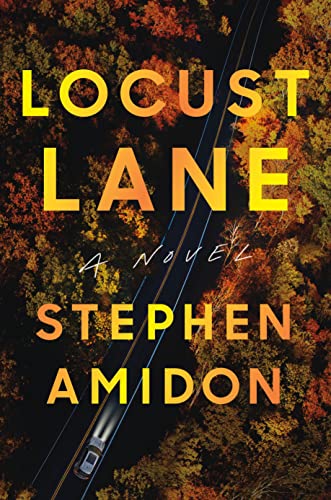Locust Lane: A Novel

“It all adds up to a slightly nasty book whose pages turn easily . . .”
There’s a clear line between crime thrillers and literary thrillers. In the former, especially when masters like Michael Connelly or Lee Child are at the tiller, there’s a comfortable and familiar arc. The case will be more complicated than it seems. The cast of good and bad guys will expand, and sometimes their roles are reversed by unforeseen events. There will be menace and setbacks. But by the end, the culprit is identified and either dead or carted off to jail.
Literary thrillers are more complex, and often don’t have that pat ending. The cops aren’t as closely observed, and the forensic evidence gets a cursory nod. The big picture is a portrait of a community, or a group of friends, and the human passions that drive them. Stephen Amidon’s work merits a blurb from Tom Perrotta (Little Children, Election), who along with Rick Moody (The Ice Storm) is one of the prime dissectors of American suburban mores. Stephen Amidon’s Locust Lane is in their tradition, but with a murder.
Suburbanites don’t come off at all well in these books. As Amidon said in a publicity interview for this book, “The divide between the seemingly serene facade of the suburbs and their often dark, dangerous interiors provides rich dramatic ground for me.” Beyond the automatic sprinklers and BMW SUVs is bed hopping, drug addiction, bad parenting, and a lot of generally irresponsible behavior.
Locust Lane in upscale Emerson, Massachusetts (outside of Boston), is where Patrick, a financial guy whose drinking is out of control following his daughter’s sordid death, sees someone in the shadows after he hits a dog. We soon find out that Locust Lane is also where Eden Perry, the wild, flame-haired daughter of Alice and Geoff, has been murdered. The suspects are Jack, the Dartmouth-bound dark-tinged third son of the ultra-wealthy Parrish family; his doting girlfriend Hannah; and Christopher, the meek, trying-to-fit-in son of Emerson’s star Lebanese chef. They were the last to see Eden alive.
Locust Lane focuses not on the teenagers, but on their parents and their shifting alliances as the police—also in the background—try to figure out who pushed Eden into a coffee table. None of them behave particularly well, between the booze and drugs and the privilege.
Amidon writes very well about all this. The book is divided into sections from the point of view of its large cast of characters. That makes it almost like an oral history, and it’s an effective structure. Here’s Celia Parrish: “The builders were making much more of a racket than she’d anticipated. They’d started to destroy the patio just after seven. By doing this, they were violating the Emerson ordinance that prohibited yard work before eight. Not that it mattered. Nobody was going to complain about noise at the Parrish house at any hour. After all, it was Oliver [Parrish] who’d drawn up the rules.”
Build high the roof beams, carpenters! J.D. Salinger’s ghost hovers over the proceedings, but he’d focus more on the kids and how, in their view, there’s a lot of phoniness under the adult sanctimony. The Parrishes throw their weight around a lot, and it is soon public that they paid off the parents of another girl, Lexi, when Jack, who harbors Donald Trump Access Hollywood tape views of women, didn’t take no for an answer. Oliver is going to do a lot of fixing to direct the authorities—and the town—toward the barely coherent Christopher—who’s just dark-skinned enough for social media to bring up 9/11.
Amidon is particularly good with the women of Emerson: Danielle, Eden’s mother; Alice, Celia’s increasingly estranged best friend (and stepmother of Hannah); and Celia herself, whose thin layer of rectitude hides a thicker one of imperious privilege. The men are mostly weaker reeds, particularly immigrant chef Michel, who’s too haunted by his wife’s death to do much for his son; and Patrick, who just isn’t going to stop drinking himself to death. The only take-charge guy is Oliver Parrish, who’s used to “handling things.”
Here's Alice’s first impression of Celia Parrish: “You brought you’re a game with Celia Parrish. The woman could stroll through a car wash and come out perfect. . . . The porcelain skin that carried a fine network of lines like an artwork that would just keep increasing in value. The extra few pounds that had accumulated in all the right places, distinguishing her from the anorexic voodoo dolls who populated Emerson.” In Bonfire of the Vanities, didn’t Tom Wolfe call these women “social X-rays”?
It all adds up to a slightly nasty book whose pages turn easily, just as is usually the case with those crime thrillers. And maybe you learn something along the way. But, of course, the idea that the suburbs aren’t what they seem is not exactly a new one.